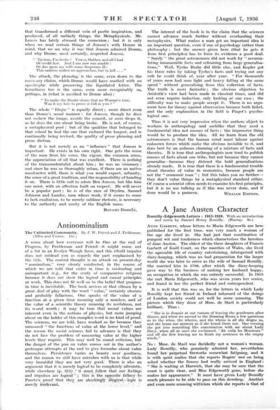Antinominalism
A nook about how everyone will be One at the end of Progress, by Feebleman and Friend—it might come out of a list in an Evelyn Waugh farce, and this ribald impulse does not mislead you as regards the part emphasised by the title. The central thought is an attack on present-day " nominalism," very clearly conducted, in the course of which we are told that order in time is misleading and unimportant (e.g., for the study of comparative religion) because it does not show the logical and causal principles at work. This does not fit well on to the belief that 'progress in time is inevitable. The book arrives at that climax by a great deal of play with the word " value," certainly obscure and probably fallacious. One speaks of the -value of a function at a given time meaning only a -number, and of the value of a scientific theory meaning its usefulness, not its moral worth ; it may be true that moral 'values are inherent even in the notions of physics, but mere jumping about on the ladder of this complex word is no kind of proof. The sciences, we are told, have worked so far because they measured " the functions of value at the lower level," and the reason the social sciences fail to advance is that they do not face the problem of measuring value at the higher levels they require. This may well be sound criticism, but the danger of the pun on value comes out in the author's grotesque attempts at the end to give formulae about value themselves. Persistence varies as beauty over goodness, and the reason we still have microbes with us is that while very beautiful they are not very good. There is also an argument that it is merely logical to be completely altruistic, while elsewhere (p.. 311) r" it this follow that our .feelings and impulses are logical " ; tills is the opposite fallacy .to Pareto's proof that they are shockingly illogicallogic is. Merely irrelevant. The interest of the book is in the claim that the sciences cannot advance much further without overhauling their metaphysics. What makes a man get an important idea is an important question, even if one of psychology rather than philosophy ; but the answer given here (that he gets it from first principles) has to force its evidence a good deal. " Surely " the great astronomers did not work by " accumu- lating innumerable facts and refraining from large generalisa- - tions." Well, Tycho Braise did little else, and Kepler got his three rules by taking Tycho's facts and trying out any rule he could think of, year after year. " For thousands of years men had seen light and heavy falling at the same speed " without generalising from this collection of facts. The truth is more fantastic ; the obvious objection to Aristotle's view had been made in classical times, and did not even require induction, only looking at one case ; the difficulty was to make people accept it. There is no argu- ment here for theory against observation because both failed, and the only explanation in the field is Piaget's psycho- logical one.
Thus it is not very impressive when the authors object to workers in anthropology and suchlike that they need a fundamental idea not masses of facts ; the impressive thing would be to produce the idea. All we learn from the old astronomers is that the human mind must labour against unknown forces which make the obvious invisible to it, and does best by an arduous churning of a mixture of facts and theories. It is true that anthropologists now tend to publish masses of facts about one tribe, but not because they cannot generalise—because they distrust the bold generalisations already made. It is true that there is a fundamental trouble about theories of value in economics, because people are not the " economic man " ; but this takes you no further— they don't value things by a metaphysical standard either. Of course a scientist often needs to examine his first principles, but it is no use talking as if this was never done, and if






































 Previous page
Previous page